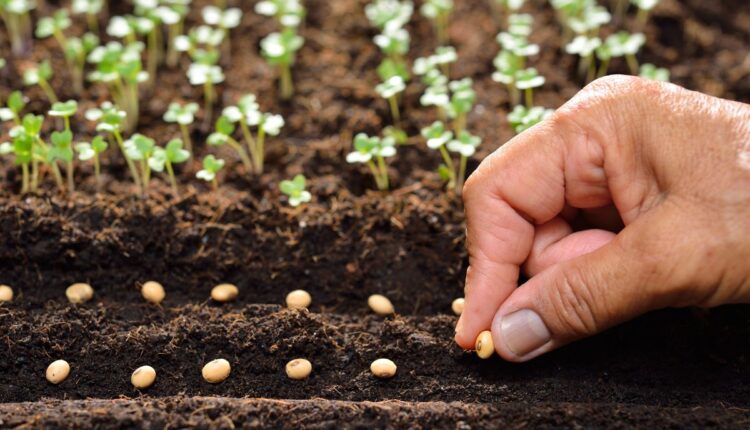Climate-friendly Seeds: In the last few years, climate change has become a major concern around the world. In an agricultural country like India, it has affected the farmers the most. Problems like change in weather pattern, uncertainty of rainfall, extreme heat and floods are becoming a threat to agriculture. This has reduced the yield of crops and has also affected the income of farmers.
In this changing environment, it is now becoming difficult to farm with traditional seeds. At such a time, climate-friendly seeds have emerged as a new hope for farmers.
What are climate-friendly seeds?
Climate-friendly seeds are seeds that have been developed in such a way that they can give good yield even in difficult conditions like heat, drought, flood, pests and diseases. These seeds are able to withstand the uncertainties of the weather and this reduces the risk of loss to the farmers. The Indian Council of Agricultural Research (ICAR) has developed thousands of such seed varieties in the last few years that are especially capable of facing the challenges of climate change.
109 new seed varieties unveiled by PM
Recently, Prime Minister Narendra Modi inaugurated 109 new climate-friendly seeds during a special program at the Pusa campus in Delhi. These seeds have been developed by the Indian Council of Agricultural Research and will be used in 61 different crops. These include 34 field crops and 27 horticultural crops.
These varieties include:
Cereals: rice, wheat, maize, millet
Oilseeds: mustard, soybean
Pulses: pigeon pea, green gram
Fodder crops, sugarcane, cotton
Fruits and vegetables: mango, tomato, potato, chilli
Spices and medicinal plants
The aim of these climate-friendly seeds is not only crop protection but also to increase the income of farmers.
Major achievements in seed development during 2014-2024
In the last ten years (2014-2024), more than 2900 seed varieties were developed in collaboration with ICAR and various state/central agricultural universities, most of which are climate-friendly.
Of these:
1380 varieties are of cereals
412 of oilseeds,
437 of pulses
376 of fiber crops
178 of fodder crops
88 of sugarcane
Of these, 2661 varieties are tolerant to biotic or abiotic stresses. This means that these seeds can withstand the effects of drought, heat, flood or pests. In horticultural crops too, 819 new varieties were developed in the last 10 years, of which 19 varieties are climate-friendly seeds.
How will the seeds reach the farmers?
The government has made a comprehensive plan to deliver these climate-friendly seeds to the farmers:
Seed production will start in sufficient quantity from Rabi 2024-25. All Seed Development Centers have been ordered to share the seeds with National Seed Corporation, State Seed Corporation, private companies, FPOs and other agencies.
Under the Farmer Participation Seed Production Program, seeds will also be produced on farmers’ fields to increase the availability of seeds.
Publicity and awareness
To make farmers aware about these climate-friendly seeds, the government is resorting to Doordarshan, radio, social media, print and electronic media.
Krishi Vigyan Kendra (KVK) is giving information to farmers by demonstrating new seeds across the country.
Seeds are also being made available to farmers free of cost or at subsidized rates under Scheduled Caste Sub Plan and North East Himalayan Region Programs.
Seed Village Scheme and Self-Reliant India
The Government of India is running the Seed Village Scheme under the “National Food Security and Nutrition Mission”. Under this, climate-friendly, organic and high-yielding varieties of seeds are being made available to farmers. In this:
50% subsidy is being given on seed cost in grains.
60% subsidy is being given per farmer for one acre in oilseeds, fodder and green manure crops.
Apart from this, National Edible Oil Mission has been approved to increase oilseed production from 2024-25 to 2030-31, so that self-sufficiency in edible oils can be achieved.
Conclusion
Today when climate change has become the biggest challenge of farming, climate-friendly seeds can prove to be a boon for farmers. These seeds are not only capable of withstanding the vagaries of weather, but are also a strong step towards doubling the income of farmers by increasing crop production. With the cooperation of the government, research institutes and farmers, this initiative will help in giving a new direction to Indian agriculture.
Contact details: If farmers want to share information or experiences related to farming with us, then they can do this by calling us on the phone number 9599273766 or by writing an email to kisanofindia.mail@gmail.com or by sending your recording. Through Kisan of India, we will convey your message to the people, because we believe that if the farmers are advanced then the country is happy.

